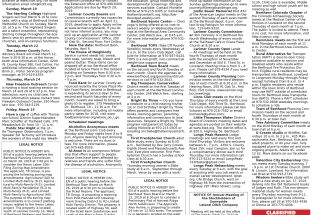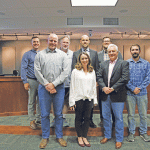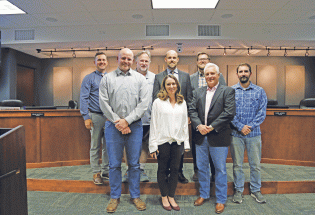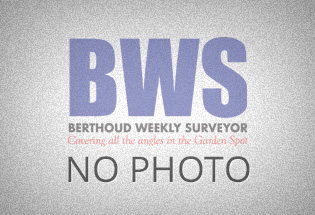Breakdown of Berthoud’s first draft for short-term rental policy
By Brendan Henry
The Surveyor
Talk of short-term rental (STR) policies in Berthoud’s town board meetings always draws a crowd. Residents of Berthoud have made it clear that the topic is polarizing, with many nuanced opinions thrown into the mix. Town staff has drafted up the first instance of potential policy for STRs, using influences from surrounding towns and cities along with ideas specific to Berthoud.
Section 1: Proposed New Definitions does more than define a STR. This section differentiates a bed and breakfast from a STR, the main difference being that a bed and breakfast operates similarly to a hotel, allowing for multiple “parties,” meaning one or more people, to dwell for some time after paying the operator. STRs, on the other hand, are only permitted by the town to allow a single “party” to reside at a time.
This section also defines the capacity for each type of lodging. Bed and breakfasts are limited to 12 or fewer guests, and STRs are limited to 10.
Section 2: Short-term Rentals in Zoning Districts shows the recognizable difference between STRs and other short-term lodging options. STRs would be allowed to operate in residential zones R1 through R4 (R5 excluded), making it unique when compared to inns (of which the only residential zone allowed to operate is R4) and hotels/motels (which can operate in R4 zones after acquiring a conditional use permit). For those used to using Airbnb and other STR services, this is not unusual, but the allowance of utilizing these residential zones for STRs has created some controversy in town.
During public comment each time this topic has been discussed by the town board and staff, concerns have consisted of saturation of STRs in neighborhoods, loss of sense of community, clogged roads due to large numbers of parked vehicles, trespassing, noise/parties and enforcement of policy.
Town staff has attempted to mitigate the controversy in Section 3: Use-Specific Standards. First and foremost, the first draft would require all operators of a STR to obtain a STR business license from the town administrator or designee and for the “prominent” display of said license on the property. The license would be valid for a year and subject to annual renewal, with renewal relying on good conduct and consideration of any violations or documented complaints.
Section 3 includes three cap options to help mitigate saturation, something that has been an open concern for residents. Option 1 would limit the maximum number of short-term rentals in town to not exceed 1% of the town’s residential structures in existence at the beginning of each calendar year. Applications for a STR license would be on a first-come-first-serve basis, and if the maximum number of STRs has been met, no more licenses would be provided.
Option 2 places a hard cap of 50 STRs in town. This would follow the same first-come-first-serve basis as Option 1, disallowing additional applicants beyond 50 approvals.
Option 3 would only allow STRs in certain zone districts, and offers a cap amount per district. TN, R1, R2, SR, and UR would allow for a maximum of 25 STRs, R4 allows a max of 10, and C1, C2, SC and UC allow for a max of 15. Again, this would be on a first-come-first-serve basis.
Section 3 sets operational guidelines for STRs as well. Only one STR is to be allowed on a single property and is prohibited from being used in a multi-family residential dwelling. This section states that the total number of guests “shall not exceed two persons per bedroom plus two additional persons per property,” and again, no more than 10 guests are permitted.
For those concerned about STR guests filling up their streets with parked vehicles, this draft would require all guest parking to be either in a garage or on the driveway.
The draft goes so far as to specify how many off-street parking spaces are required per number of bedrooms, as one to two bedrooms require at least one parking space, three to four bedrooms require three spaces and five bedrooms require four off-street parking spaces.
STRs, under the draft, are not permitted to be used or advertised as an event space, “such as weddings, commercial or corporate events.” Additional prohibitions include staying overnight in any motor vehicle, tent, or outdoor structure, and disallowing changing the outside appearance of the dwelling or premises and “shall not disturb the neighborhood character.”
In addition to general conduct and cap options, Section 3 covers safety standards. Those who intend to get a STR license must pass a life-safety inspection in compliance with Berthoud’s building code, and this is required each time the STR license is to be renewed. Properties must include either an approved automatic fire sprinkler system or fire extinguishers in “readily accessible and visible locations for immediate use.”
To ensure both property and neighborhood safety, the property owner of the STR must designate a local property manager to be available at all times to respond to complaints or violations of the law, and this property manager must live within a 20-mile radius of the STR property. Property managers must be able to respond to complaints within an hour of reception.
The property owner is required to provide a written notice to all property owners within 500 feet of the STR within ten days following town approval. In addition to this, the owner must provide proof of property and liability insurance.
The draft is not final and still in the works. To view the first draft in its entirety, it can be located at berthoud.org/178/Planning-Department under the Short-Term Rental Regulations Project tab.
- September, 21 2018

Obituary – Garran David Ryan
Garran David Ryan August 3, 1961 – September 9, 2018 Garran...
- June, 13 2014

Leslie Ross Mechem ~ Jan. 12, 1937 &#...
Leslie Mechem of Berthoud, CO passed away on May 25, 2014 in Mount Dora, FL....
- March, 08 2019

- August, 23 2023

- September, 28 2016

Jason Charles Holden: Aug. 1973 — Sep...
Jason Charles Holden, “Jay,” a resident of Berthoud, Colo., died unexpectedly on Sept. 20, 2016,...
- May, 05 2017

Berthoud sees 37 personal bests at We...
By Kristi Leonard The Surveyor Photo by Karen von SeggernSenior sprinter...

Unified basketball comes to Turner Middle School
Community News

Mike Grace says goodbye as Brett Wing joins town board
Community News
POLICEBLOTTER
Community News
Northern Water sets C-BT quota at 70% for 2024
Community News

Emotions run high during Revere Property hearing
Community News
Snowpack at 119% above normal
Community News

Karspeck to serve third term as Berthoud mayor
Community News
COMMUNITY CALENDAR:
Community Calendar – add an event
Homestead Fine Art Gallery First Fridays OPEN HOUSE
03 May 4:00 PM - 7:00 PM
Homestead Fine Art Gallery First Fridays OPEN HOUSE
07 Jun 4:00 PM - 7:00 PM
Homestead Fine Art Gallery First Fridays OPEN HOUSE
05 Jul 4:00 PM - 7:00 PM
Homestead Fine Art Gallery First Fridays OPEN HOUSE
02 Aug 4:00 PM - 7:00 PM
Homestead Fine Art Gallery First Fridays OPEN HOUSE
06 Sep 4:00 PM - 7:00 PM
Homestead Fine Art Gallery First Fridays OPEN HOUSE
04 Oct 4:00 PM - 7:00 PM





